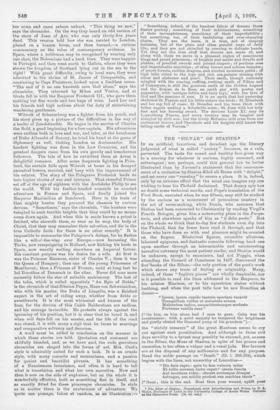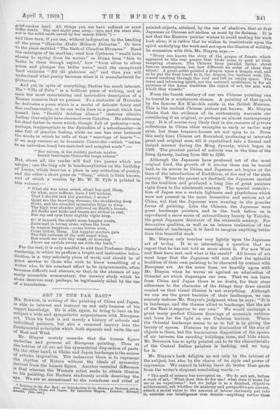THE "SILVAE " OF STATMS.* IN an artificial, luxurious, and
decadent age the literary judgment of what is called " society " becomes, as a rule, perverted. The taste for sound and healthy fare gives way to a craving for whatever is curious, highly seasoned, and extravagant ; nor, perhaps, could this general law be better illustrated than by Juvenal*s statement that the announce- ment of a recitation by Statius filled all Rome with "delight," and set every one "running" to secure a place. It is, indeed, only by an extreme effort that the mind can imagine any one
wishing to hear his Thebaid declaimed. That dreary epic has no doubt some technical merits, and Pope's translation of the First Book, executed when he was fifteen, may still be studied by the curious as a monument of precocious mastery in the arb of verse-making, while Dante, who assumes that Steak's bad been converted to Christianity by reading Virgil's Fourth Eclogue, gives him a noteworthy place in the Pure°. torie, and elsewhere speaks of him as "it doles poeta." But on the whole we think that to-day few students even dip into the Thebaid, that far fewer have road it through, and that
those who have done so with real pleasure might be counted on the fingers. Rhetorical figures, recondite allusions,
laboured epigrams, and fantastic conceits following hard one upon another through an interminable and uninteresting narrative outweary the most patient reader, and Statius would be unknown, except to examiners, had not Poggio, when attending the Council of Constance in 1417, discovered the five books of the Silvae,—the only portion of the poet's work which shows any trace of feeling or originality. Many, indeed, of these "fugitive pieces" are wholly despicable, nor
is it possible to read the lines addressed to the Emperor, to his minion Eiarinos, or to his equeetrian statue without loathing, and when the poet tells how he saw Domitian at
dinner-
"Ipsum, ipsum cupido tantnm speotare vacavit Tranquillum vultus et maiestate serene Mulcentem radios, summittentemque modest° Fortuna° vexilla sus.° "
(" On him, on him alone had I eyes to gaze. Calm was his countenance; with a quiet majesty he tempered the brightness and gently abated the blazoned pomp of his grandeur ")— the "stately measure" of the great Mantuan seems to cry out against such prostitution. And although in those evil days servility to a tyrant may possibly be excused, yet, as seen in the Silvae, the Muse of Statius, in spite of her graces and
cosmetics, is too often a vulgar and a venal jade. Her favours are at the disposal of any millionaire and for any purpose.
Read the noble passage on "Death" (II. i. 208-234 which begins with the lines, not unworthy of Lucretius-
" Rio finis rapto ; quin tu lam vulnera sedas Et tollis mersum luctu eaput ? °Innis functa Aut moritura vides : °haunt noctesque diesque Astraque, nee solidis prodest sua machina terris " (" Gone ; this is the end. Heal then your wound, uplift your • .The &atm .of Sicilia's— Translated, with Introduction and Notes, by D. A. Slater, Professor of Latin In the University, College of South Wales. oxioras at the Clarendon Preset. [3s 6L net.1
grief-sunken head. All things you see have suffered or must suffer death. Day and night pass away,—aye, and the stars also, nor is the solid earth saved by her massy fabric")— and then turn, if you can, without indignation to the heading of the poem "Glaucias Atedii Melioris Delicatus." Or turn to the piece entitled "The Bath of Claudius Etruecus." Read the catalogue of its marbles; read how Cytherea "would have aliosen to spring from its waters" or Diana been "fain to bathe in them though espied," how "from silver to silver Pours and plunges the blithe wave," until the enraptured bard exclaims "Nil ibi plabeiton egg," and then you will understand what poetry becomes when it is manufactured for Plutocrats.
And yet, in spite of everything, Statius has much interest. Bis "Villa of Felix" is a brilliant piece of writing, and at once the most entertaining and instructive description of a Roman mansion that we possess. To a statuette of Hercules he dedicates a poem which is a model of delicate fancy and fine craftsmanship, or he can write lines to a parrot which has passed into "Death's dateless silence" (aeterna silentia Lethes) that might have charmed even Cattillus. He addresses
his dead father in verse which, though full of pedantry—not, Perhaps, inappropriate in the Epicedion of a schoolmaster—is also full of genuine feeling, while no one ha e ever bettered the words in which he tells of that " marriage of hearts "— if we may venture so to translate Concordia—which "unites in an unbroken bond two matched and mingled souls" :—
" Nee mirum si vos conlato poctore mixtos Iunxit inirupta Concordia longs, catona."
But, above all, the reader will find two poems which are unique; one the long ode in hendecasyllables on the birthday of Lucan, which deserves a place in any collection of poetry, and the other a short piece on "Sleep," which is little known, and of which a version by Mr. W. H. Fyfe is printed in this volume:— " What sin was mine, sweet, silent boy-god, Sleep, Or what, poor sufferer, have I left undone, That I should lack thy guordon, I alone? Quiet are the brawling streams, the shuddering deep Sinks, and the rounded mountains feign to sleep. The high seas slumber pillowed on Earth's breast; All flocks and birds and beasts aro stilled in rest, But my sad eyes their nightly vigils keep.
0! if beneath the night some happier swain, Entwined in loving arms, refuse thy boon In wanton happines,—come hither soon, Come hither, Sleep. Let happier mortals gain The full embrace of thy soft angel wing, But touch me with thy wand, or hovering Above my eyelids sweep me with thy train."
For the rest, it is only needful to add that Professor Slater's rendering, to which he prefixes a bright and instructive intro. unction, is a very scholarly piece of work, and should be of great service to those who wish to know something of a writer who, in his constant effort to be epigrammatic, often becomes difficult and obscure, so that, in the absence of any easily accessible commentary, the cursory study which he alone deserves may, perhaps, be legitimately aided by the use of a translation.











































 Previous page
Previous page